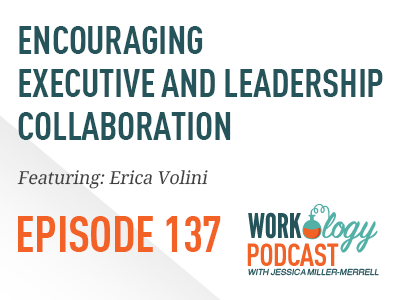Do you remember when we were all about discussions surrounding the 2020 workplace? Well, that 2020 workplace is nearly upon us, and while the workplace is shifting the way we might expect, there are a number of challenges and themes that we in human capital are looking forward to in 2030 and beyond. Today we’ll be diving into results and themes from Deloitte’s most recent Human Capital Trends Report.
Episode 137: Encouraging Executive and Leadership Collaboration with Erica Volini (@erica_volini)
Erica Volini is the US Human Capital leader for Deloitte Consulting. In this role, she is responsible for the 4,000+ practitioners focused on helping organizations solve their most complex and pressing human capital issues. Deloitte’s latest Human Capital Trends Report shares some interesting and also pressing opportunities for human resources leaders.
One such trend that Erica and I discuss is the lack of executive collaboration for senior leaders across the organization. Eric’s research revealed that seventy-three percent of executives report that C-suite leaders rarely, if ever, work together on projects or strategic initiatives. This shocking lack of collaboration and siloed leadership comes at a time when organizational teams need to be working together, not separately. These behaviors need to be modeled from top leadership especially as we move towards a more agile and flexible business model.
[bctt tweet=”73% of execs report that C-suite leaders rarely, if ever, work together on projects or strategic initiatives #hrtrends #leadership” via=”no”]
If this lack of collaboration wasn’t concerning enough, Erica tells me that most of the survey respondents were executive leaders themselves. They identify that this behavior exists but are making little to no changes to bridge these behaviors. This sets the table for HR to drive an organization-wide change.
HR’s Opportunity to Not Have a Seat at the Table
Erica also shares that HR is in a weird position that they are a trusted advisor and can’t mandate but can encourage this type of executive collaboration. She says that this fact is particularly important since, based on the survey results, employees model the behaviors and discussion of how to encourage collaboration among your executive teams and leadership. I think it’s especially important to help these executives model behaviors so that others within the organization will follow.
The Workplace Needs More Digital Leaders
One of the other trends uncovered in the survey was the need to upskill and keep working with our experienced and more senior workplace leaders. We are living longer and spending 40 or more years as workplace professionals. Erica says these businesses need to be thinking about upskilling their current workforce and finding ways to tap into these highly qualified workers.
Older workers need to be seen as agents of change. At present, most businesses have no present or future strategy for this segment of the workforce. This is a huge area of opportunity and needs plans and strategies to accommodate them. Again, Erica believes this is a defining moment for human resources professionals to set the stage at workplaces and lead the way.
Erica specifically mentions the need for leaders to be “digital” leaders. These, she says, are professionals who are flexible when it comes to technology and workplace resources but don’t have to be digital natives. I asked if her use of “digital” instead of mentioning “millennial” was intentional. She said yes. Everyone needs to embrace the digital workplace and business world. It isn’t about generations. We have to be aware, focused, and willing to evolve and grow as the business and landscape changes, which happens to be online.
Erica says that in order to be a digital leader, HR needs to define and set those characteristics and then assess their leaders to see where they are. Again digital is a mindset, not a technology.
What is the Social Enterprise?
What is a social enterprise? The social enterprise is an important focus in Deloitte’s trends report. Erica says that the social enterprise means that organizations will start to be measured on more than just their financial performance. These social enterprises will be judged based on how they treat and respect all stakeholders in external environment: shareholders, customers and community. Key elements of the social enterprise:
– Power of the individual who has a stronger voice than ever before. There is a call for organizations to play a stronger role in social and community.
– Technology is powerful but there is an adverse impact if not managed appropriately.
Erica’s podcast interview is filled with the obvious passion and love she has for the human capital industry. I enjoyed our insightful discussion and I hope you do too.
RECOMMENDED RESOURCES
– Eight Ways to Build Collaborative Teams
– 2018 Global Human Capital Trends from Deloitte
– The Longevity Dividend: Work in an Era of 100-Year Lives
– 4 Tips for Implementing Enterprise Collaboration Networks
– Secrets to Workplace Teamwork from NASA
How to Subscribe to the Workology Podcast
You can also click here to find out how to be a guest on the Workology Podcast.
*A special thank you to my production team at Total Picture Radio.







